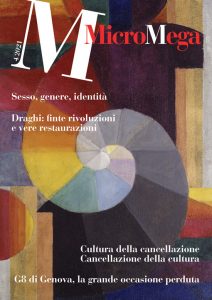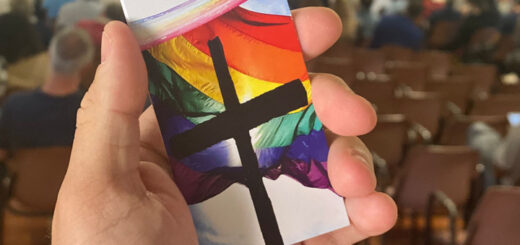In July 2021 on the monthly Micromega there is talk of "sex, gender and identity"
In the new issue of the monthly magazine Micromega, On newsstands and bookstores from 15 July 2021, an entire section is dedicated to the existential, scientific, psychological and political aspects of the issue "Sex, genre and identity", With interventions by Giorgio Vallortigara, Simona Argentieri, Maria Serena Saore, Tamar Pitch, Porpora Marcasciano and testimonies from the trans world collected by Elettra Santori.
The parliamentary debate on the Zan bill has rekindled the discussion around the identity of gender, in article 1 of the bill defined as "the identification perceived and manifested of itself in relation to the genre, even if not corresponding to sex, regardless of having concluded a transition path".
 Far from the contingency and the excitement of the political debate, Micromega deepens the theme of the relationship between sex, gender and identity in one of the icebergs of the number 4/2021.
Far from the contingency and the excitement of the political debate, Micromega deepens the theme of the relationship between sex, gender and identity in one of the icebergs of the number 4/2021.
The section opens with the testimonies collected by Elettra Santori, which give us back the variety and complexity of irreducible experiences: Neviana Calzolari, he tells his transition MTF (bad to female, from men to woman) explaining why it is important that the difference between trans women and biological women are not deleted and because it is contrary to that everyone can arbitrarily indicate on the documents the genre with which he identifies himself; Massimo D'Aquino, who made the female-to-maker transition (FTM, from women to men), tells his childhood, relationships, surgery and underlines the importance of his own feeling compared to his body; Valentina Beoni29 years old, he explains how - after starting the FTM transition - he understood that this was not his way and started a deduction path, denouncing the superficiality with which he sometimes approaches the theme; and finally Yes. (Fantasia name) explains why he does not want to take any transition path neither hormonal nor surgical and yet wants to be considered a man, because this is how he feels.
However, the reflection of the magazine directed by Paolo Flores d'Arcais does not stop at the necessary listening to the different personal experiences. The neuroscientist Giorgio Vallortigara He explains why from a biological point of view we can only speak of two sexes and why the fact that this distinction does not exhaust the complexity of the identity of each does not move the terms of the question of a comma.
The psychoanalyst Simona Argentieri Instead, guides us in the psychoanalytic meanders of gender identity, warning us from the temptation to translate the complexity into confusion, in an indistinct and fluid all that instead of facing the conflicts of each of us removes them: the risk is in fact to not face their inconvenience, claiming to defuse them with mere lexical operations or intervening drastically on their body.
To close the section of Micromega on the subject is the analysis of the question from a political point of view: Maria Serena Sapegno, Tamar Pitch is Mercasciano purple - In a Franco dialogue that never expires in the personal attack - they discuss the social and political consequences of the matter. Why do you want to replace sex with the genre? What is the stake? If biology is no longer counting but self-perception, what are the consequences, especially for women? A comparison that traces the history of feminism, trying to open up to new instances without losing the ground earned.
From the summary of the new number of micromega n.4/2021
Elettra Santori (edited by) - Voices from the world t
We tend to approve the people who define themselves in a single category, while as always individual experiences are irreducible to each other, in terms of both personal experience and political positions. Journey into a complex world, listening to the direct voices of transsexuals who have completed the transition (from men to women and women to men), of transgender who instead claim the choice not to do it and those who, after starting it, decided to go back.
Giorgio Vallortigara - Organic Sex: let's clarify
In homo sapiens sex binarism is a fact, which has very precise evolutionary reasons. That this biological distinction does not exhaust the complexity of the identity of each and that individuals, such as phenotypes, can fall more or less well in categorization does not move the topic of a comma: biological sex is a binary category.
Simona Argentieri - Gender identity between nature and culture
The construction of our identity, including gender, is a complex operation, which crosses different levels: biological, the psychological, the social one. The new prevailing conformism tends to translate the complexity into confusion, in an indistinct and fluid all that is deflated rather than facing the conflict of each of us. And if psychoanalysis cannot and does not want to establish how everyone should live and love, however, he cannot give up trying to analyze and understand the becoming of the human.
Maria Serena Sapegno / Tamar Pitch / Porpora Marcasciano - Sex and genre: the stakes
Why do you want to replace sex with the genre? What is the stake? If biology is no longer counting but self -perception, what are the social and political consequences (especially for women)? A dialogue that traces the history of feminism, trying to open up to new instances without losing the land earned.






